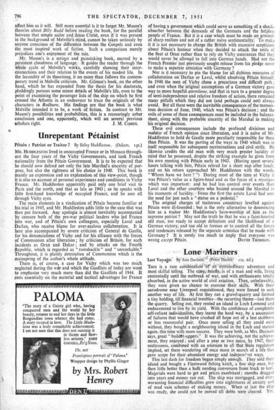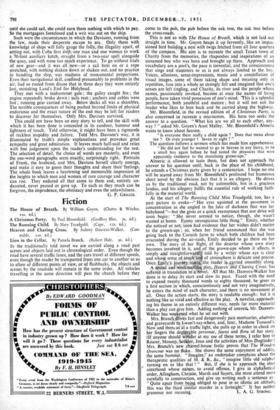Lone-Matiners
THIS is a rare cdmbinalialBlvd1idf6rfhary adventure and most skilful telling. The sttaiMefltNtis of a man and wife, living contentedly until the outbreak of war, and with enthusiasms totally absorbed, in the active world of civil aviation.. Then, unbelievably, they were given no chance to exercise their skills. With their aerodrome near Liverpool requisitioned, they were forced to seek another way of life. At first they ran a gravel-quarry and farmed a tiny holding, till financial troubles—the recurring theme—lost them the quarry. Selling out, they rented an island in Loch Lomond and endeavoured to live by its yield. With the confidence of completely self-reliant individualists, they learnt the hard way, -by a succession of failures that would have crushed all hope out of a less stubborn or less resourceful pair. Once more selling all they could exist without, they bought a neighbouring island in the Loch and started again, this time witb more success. They were both, as Mrs. Davison says, great "builder-uppers." It was the achieving, not the achieve- ment, they enjoyed ; and after a year or two more, by 1947, their restlessness, combined with an aversion to all that State regulation implied, set them wandering off once more in search of a life that gave scope for their -abundant energy and indepencimt ways. This last dash for freedom began simply enough. They sold their island and bought a Fleetwood fishing ketch, a fine ship once, but then little better than a hulk needing conversion from truck to keel. Materials were hard to get and prices exorbitant ; months dragged into years and money ran out. The ship was mortgaged, and ever- worsening financial difficulties grew into nightmares of anxiety and of mad vain schemes of making money. - When at last the ship was ready, she could not be moved till debts were cleared. Yet. until she could sail, she could earn them nothing with which to pay. So the mortgagees foreclosed and a writ was out on the ship. Such were the circumstances in which the Davisons, running from the law, made their desperate escape to sea. Only those with knowledge of ships will fully gauge the folly,-the illegality apart, of setting out, with Cuba first star); one man and one woman to work a 70-foot auxiliary ketch, straight from a two-year spell alongside the quay, and with none too much experience. To go without trials of new gear—and it was all new—or a sail bent on or a rope stretched, with nothing shaken down or shaken out, and no practice in handling the ship; was madness of monumental proportions. Even their navigational skill, confined presumably to problems in the air, had so rusted from disuse that in three days they were entirely lost, mistaking Land's End for Holyhead.
They met with a midsummer gale ; the galley caught fire ; the engine repeatedly broke down ; sails rent ; anchors and cables were lost ; running gear carried away. Below decks all was a shambles. The terrible consequences of being pushed beyond limits of physical endurance and the exact nature of the end may be left for readers to discover for themselves. Only Mrs. Davison survived.
This could not have been an easy story to tell, and the skill with which it has been done is concealed, in its candour, humour and lightness of touch. Told otherwise, it might have been a rigmarole of reckless 'stupidity and failure. Told Mrs. Davison's way, it is illuminated by truth's simple explanations and provokes great Sympathy and great admiration. It leaves much half-said and relies with fine judgement upon the reader's understanding for the rest. The selection of detail, the choice of words are masterly, and even the one-word paragraphs seem exactly, surprisingly right. Portraits of Frank, the husband, and Mrs. Davison herself clearly emerge, and make it easy to guess their thoughts and share their 'feelings. The whale book leaves a heartening and memorable impression of the heights to which men and women of rare courage and character can rise. They endured all that came to them and, entirely un- daunted, never paused- or gave up. To such as they much can be forgiven, the imprudence, the obstinacy and even the unlawfulness.
G. P. GRIGGS.



















































 Previous page
Previous page